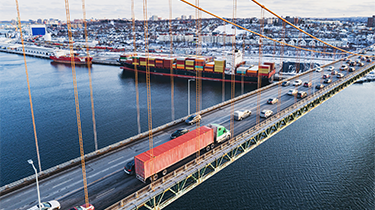2024: The year the world votes
EDC’s Country Risk Quarterly cuts through the noise amid the uncertainty in critical election year

In Export Development Canada’s most recent Trade Confidence Index, concerns over how the world’s record number of elections could impact the economy wasn’t on the radar for most Canadian exporters.
The Top 5 risks identified in our year-end survey, included concerns of a deep global recession, followed by supply chain constraints, a financial crisis in the United States, an emerging market debt crisis and labour constraints. Conspicuous in its absence was the risk of policy uncertainty, as half of the world’s eligible voters head to the polls in 2024, across more than 60 countries.
Since mid-2022, the world’s central banks have tightened monetary policy in a co-ordinated and decisive bid to tame the inflationary pressures that resulted from pandemic-induced economic distortions. While a deep global recession hasn’t materialized, economic data continue to add to the uncertainty, sending mixed signals around the nature of the landing ahead—be it hard, soft or whether we’ll experience one at all. But the nature of the landing may not be as important as who’s flying the plane.
You should also check out
EDC interactive tool offers economic insights on Canada’s Top 75 trading partners.
In the U.S.—the destination for roughly three-quarters of all Canadian exports—the Federal Reserve hiked interest rates to a range of 5.25% to 5.5%. As of January, the central bank’s preferred inflation gauge had touched its lowest point in almost three years, and inflation appeared to be moving decidedly toward target.
Meanwhile, against all expectations, employment metrics underscored the surprising resilience of the labour market. The soft landing, which seemed implausible just a few quarters ago, is now increasingly in sight.
The prospect for a soft landing in the U.S. is unequivocally good news for Canadian exporters, whose fate has always been closely tied to that of the U.S. economy. But arguably more important, is the American trade policy discourse in the runup to their November presidential election, which could impact the export fortunes of key Canadian industries and have crucial medium- to long-term ramifications for continental investment decisions.
Also looming on the horizon is the 2026 review of the Canada-United States-Mexico Agreement (CUSMA). Further increasing uncertainties, both regionally and around the CUSMA review, is the Mexican federal election, scheduled for June. With at least two of three CUSMA members holding elections this year, potential policy shifts could impact business investments and trade policy in the region. All three countries have rolled out some form of industrial policy, aimed at securing critical industrial technology supply chains, among others.
In Europe, the economic outlook is quite different, as geopolitical shifts have raised serious economic questions. What does the loss of Russian energy mean for domestic industry? What’s the impact of escalating trade tensions with China on advanced manufacturing? And how will Red Sea shipping disruptions affect the fight against inflation?
Germany’s the most severely impacted by these challenges, as the country’s energy-intensive industries relied on cheap Russian gas. German automakers are also bearing the brunt of the alleged dumping of cheaper Chinese electric vehicle (EV) technologies. Softer Chinese domestic demand is also problematic for German exporters, who count the country as their top export market. As a result, the German economy is expected to have contracted by 0.3% in 2023, and growth will remain subdued over the next few years.
France’s economy is expected to have grown by a modest 0.9% in 2023. The country’s nuclear energy option, as well as the greater role of services and domestic consumption, supported by fiscal stimulus packages, helped shield it from some of what ails the German economy. But broad European weakness will weigh on Canadian export prospects in the region over the near-term.
More than 400 million eligible voters are set to cast a ballot this year in European parliamentary elections, the second-largest democratic election in the world. The European Union (EU) has led the way on climate regulation and decarbonization efforts and is a stalwart of trade liberalization and the rules-based trading order. Canadian exporters, especially in the cleantech and sustainable energy space, will keep a keen eye on the outcome of these elections, as EU policy tends to reverberate beyond European capitals.
While elections have yet to be scheduled for the United Kingdom, one must be called before January 2025. Prospects for a change in government, after 13 years of Conservative rule, add to uncertainties, especially in the wake of the recent breakdown of negotiations on a trade deal between Canada and the U.K.
Three more notable national elections will be held in the Indo-Pacific region. Charting the political discourse in these countries is even more important as they realize their economic potential and take their place among the most sought-after markets of opportunity.
Beginning in April, general elections are expected to be held in India, the world’s most populous democracy. In Indonesia, Defence Minister Prabowo Subianto is on course to win the presidency in the world’s third-largest democracy. South Korea’s legislative election, in April, will be the first where voters aged 60 and older will outnumber those in their 20s and 30s.
The bottom line?
The world will see more elections this year than in any other in history. These elections come as we look to put the pandemic economic crisis behind us, amid ongoing war and heightened geopolitical uncertainty. For Canadian exporters, keeping a close watch on the policy environment may help balance the opportunities and the risks, and manage the inevitable volatility surrounding these votes.
EDC Economics’ Country Risk Quarterly provides information on more than 50 countries, helping to inform investment and trade decisions. These insights will enable you to stay on top of country risk and make better decisions in 2024.
This week, special thanks to Sanjam Suri, a country risk analyst on our Country & Sector Intelligence team.
As always, at EDC Economics, we value your feedback. If you have ideas for topics that you’d like us to explore, please email us at economics@edc.ca and we’ll do our best to cover them.
This commentary is presented for informational purposes only. It’s not intended to be a comprehensive or detailed statement on any subject and no representations or warranties, express or implied, are made as to its accuracy, timeliness or completeness. Nothing in this commentary is intended to provide financial, legal, accounting or tax advice nor should it be relied upon. EDC nor the author is liable whatsoever for any loss or damage caused by, or resulting from, any use of or any inaccuracies, errors or omissions in the information provided.

















